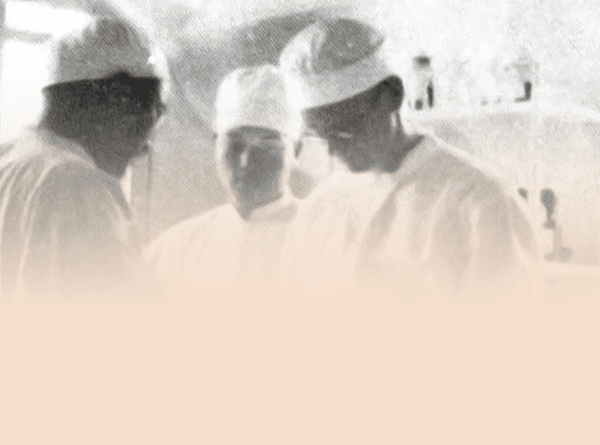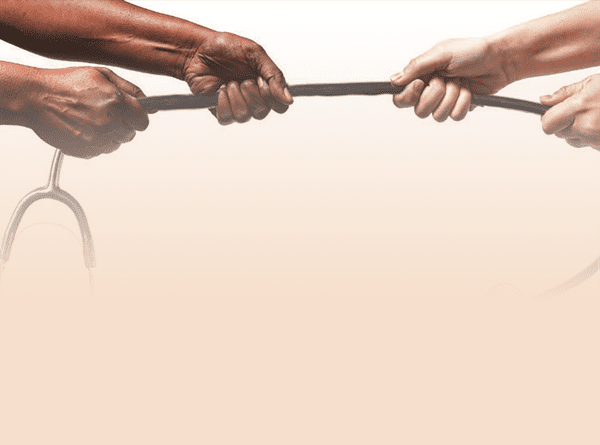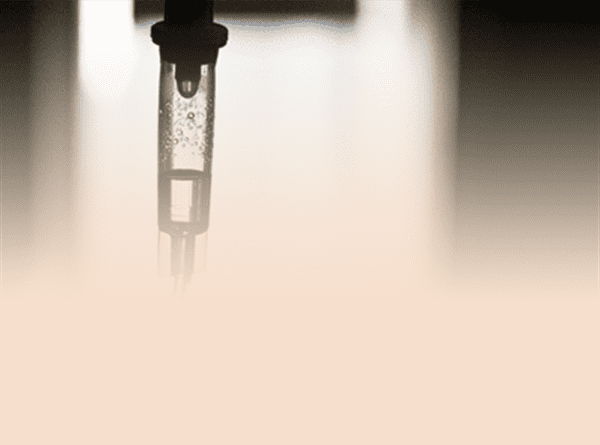Malpractice Fear
By Curtis E. Harris, M.S., M.D., J.D.
Today's Christian Doctor, Winter 1996, Volume XXVII, Number 6.
Editor's note: This article is the second of a series dealing with the issue of medical malpractice.
Here's what often causes lawsuits and what you can do to avoid them
For doctors, nothing is more sobering than receiving notification that you are being sued.1 The emotional stress of defending a malpractice case can lead to depression, isolation, and self-doubt, and can seriously test the strength of both personal relationships and Christian faith.1
The majority of physicians who have been in practice for more than ten years have been sued at least once, and generally they understand that it can happen again. It's much easier to prevent a malpractice than it is to defend against one. Quality medical care remains the single most important factor in the prevention of a malpractice suit, but quality care alone is often not enough.
Prevention of a malpractice claim begins with an understanding of the law itself. In order to understand malpractice law, it is important to be familiar with three legal terms: tort, negligence, and causation.
The Elements of a Tort
A tort is a wrong or injury resulting from a breach of a legal duty that exists by virtue of society's expectations regarding interpersonal conduct. A tort contains four elements: a (1) breach of a (2) duty which (3) causes an (4) injury. If any one of these elements is absent, a case is not recognized by law. While it is beyond the scope of this article to discuss the elements of a tort in detail, it is important to understand what is often the central issue in malpractice, causation, which we will look at shortly.
Negligence and the Christian Doctor
Malpractice is a tort which is normally based on the principle of negligence.' The classical definition of negligence is a failure to exercise that degree of care which a person of ordinary prudence (a reasonable person) would have exercised under the same circumstances. The legal definition of negligence does not involve an intentional injury, but is based on an unintentional injury. Therefore, when a physician is sued for malpractice, the claim is based on an unintended harm caused by a physician who had the responsibility to care for a patient. It is important to remember this simple and basic fact of law. Too often, physicians believe that they are being accused of an act with moral or ethical implications, rather than an accidental occurrence. Just as a momentary lapse in judgment can cause a serious automobile accident, a momentary lapse in medical judgment can cause a patient harm. However, neither malpractice nor an automobile accident are typically moral or ethical events.
It is here that Christian physicians may be most personally vulnerable. Consider first the circumstance in which malpractice has occurred. To the extent that we approach our practice as a ministry and treat our skills as God-given, when our actions hurt another and the harm was due to substandard care, it is as if we have wasted our skill and sinned against God. However, I think this ignores the essential element of sin, which is willful or intentional disobedience to God. Imperfect judgment based on imperfect information without the intent to harm does not make our actions sinful or subject to moral judgment, regardless of how badly we may feel about what happened. Even though there may be an occasional gap between our skill and our practice, that gap is usually not the result of specific personal sin.
And if we have committed malpractice, what then? If, after thorough and careful review of the facts of the case, it is apparent that we delivered substandard care, should we admit it? I believe the answer must be yes. We should tell our attorney. I recently saw a plaintiff's attorney renew his faith because a Christian physician admitted fault in a malpractice suit. Even in the midst of a lawsuit, we must keep Christ center-stage.
Most often, however, physicians are sued when there is merely disputable evidence of malpractice. One of the most difficult situations we face is to be accused of doing something we did not do. If fault exists, it is at least possible to deal with it. But when we sincerely feel we did nothing wrong, we can become overly defensive, angry, frustrated, and bitter. We can begin to wonder what our colleagues think about us and which patient will sue us next. It is here that forgiveness and understanding necessarily come into play. Understanding can begin when we realize that the pain or loss suffered by our former patient is the driving force behind the suit against us, and that the loss of health or of a loved one is life's most devastating event. Forgiveness can begin when we realize that our salvation is based on grace, not fairness or justice.
In the most famous trial in history, Christ was oddly silent when unfairly accused. He undoubtedly had done all things well, but endured false charges. When we defend ourselves in a malpractice suit, at least one passage of Scripture should stay in our minds: "But love your enemies, do good to them ... [for then] you will be sons of the Most High, because He is kind to the ungrateful and wicked" (Luke 6:35, NIV). It is what we do when unjustly accused that matters most.
Three Views of Causation
Patients sue their doctors for a number of reasons, the most common of which is a sudden and unexpected "bad outcome" that is either expensive to correct or causes a profound economic or personal loss. 4 In the face of personal tragedy, many people choose to blame others in an attempt to find a meaningful answer to the age-old question, "Why me?" In a society increasingly based on radical self-determinism, someone else must be responsible.
While it is certainly true that substandard care causes a percentage of all injuries, the overwhelming majority of claims brought to an attorney have little to do with the quality of care delivered by the physician.' The majority of angry patients or families have a naive belief that medicine is an exact science and that physicians are capable of prolonging life and improving health in virtually all circumstances. Therefore, the thinking goes, if a cure is normally expected, then a bad result must have been caused by someone's error.
A patient or family will most frequently contact an attorney because of an erroneous view of causation. Common experience teaches us an often erroneous rule of causation-that the event closest in time to any change in health or change in circumstance was the cause of that change.' Events and outcomes are often grouped together based solely on their timing. Therefore, if close in time, the black cat that crosses our path or the cold wind "that blows no good" can be blamed for "bad luck" or ill health. A piece of clothing or a number can be "lucky" to an athlete or a gambler. In the same way, a physician can be given credit for an improvement in health that he merely observes-or blamed for a death or injury that he had no reasonable way to anticipate or influence. Few patients understand the scientific concept of "causation."7
However, it is equally true that few physicians understand the distinction between medical causation and legal causation. For example, when I, as a medical scientist, say that a certain viral infection is ssociated with a particular set of complications, I am typically trunking in terms of a high probability, such as greater than a 95 to 99 percent probability (two or three standard deviations). Legal causation in a malpractice case is far less precise.' It is based on the preponderance of the evidence or that something is "more likely than not." Legal causation is similar to (though not identical to) a "working diagnosis" in medicine. The legal phrase "to a reasonable degree of medical certainty" does not mean scientific certainty, but merely more likely than not.
Legal causation in a malpractice case is a social compromise between scientific certainty and the common view of causation. Just as it would not be fair to blame a physician for every poor result, decades of courtroom experience have determined that it would not be fair to make the patient prove substandard care to a high degree of certainty, given the uncertainty and variability inherent in medical care itself. Legal causation simultaneously recognizes the "art" of medical science while refusing to insulate the physician's behavior from all blame due to an overbroad view of the variability of acceptable standards of care. While the judgment that substandard care was or was not given is necessarily made up of a series of facts that are based on a high degree of probability, the ultimate conclusion of legal causation is less precise.9
The Best Ways to Prevent Lawsuits
Most malpractice cases are brought based on the belief that the physician's actions caused an injury, and most cases are defended on the basis that the physician's actions were not the cause. Anything in the physician's behavior or in the medical record that will support a lack of causation will help prevent both the filing of a malpractice suit and an unfavorable judgment.
Most medical malpractice experts agree that there are two important things a physician can do to prevent a malpractice charge: first, document carefully what was done; and second, maintain good rapport with patients. A few of the common errors and suggestions for improved practice follow.
Documentation
In order to understand the importance of documentation, it is necessary to explain how a malpractice case typically reaches trial. First, the patient or the family of the patient consults an attorney, who screens the complaint for both reasonableness and for any personal conflict of interest. Approximately one third of all complaints do not proceed beyond this consultation with an attorney because they are felt to be without merit. A complaint that survives this stage may be filed immediately due to statute of limitations restrictions or the personal practice of an individual attorney, but on most occasions medical records are requested in order to further review the merits of the claim before filing a case. Since the attorney and his expert will want to know about the patient's health for three to five years prior to the alleged malpractice, as well as the period of time since the event, it frequently takes three to six months to complete the record. Records are requested from all known sources, even though this often produces duplicate notes and dictations. Until a case is filed, the physician accused of malpractice is frequently unaware of a problem, unless his records were specifically requested by the law firm for reasons that would provide a warning.
When the records are reasonably complete, they are reviewed by a paralegal, nurse, or physician expert to determine if a case should be filed (or if a case has been filed, if it should continue). In my experience, only one in four of the complaints or filed cases proceed beyond this point.
Once a case is filed, the formal process called "discovery" begins. Discovery includes not only the medical records, but also a series of written questions (interrogatories) and depositions of all parties, and may include the review of additional records not previously found. Ninety percent of all cases filed are dropped or settled during or after the formal discovery process, the majority of which are in the favor of the physician.10
Thorough documentation often stops a malpractice suit before it is filed or before it proceeds to trial. The single most important factor in resolving a complaint before trial is the medical record. In my experience, fewer than 10 percent of all the records I review clearly evidence malpractice. However, well over half of the cases have major problems in documentation, which can lead to the need for legal discovery. Documentation problems frequently induce an attorney to file a case in order to understand more about what actually occurred, since an inadequate or incomplete record implies or suggests substandard care. Good documentation includes evidence of the diagnosis and treatment, informed consent discussions, the options considered, and the reasons for the chosen recommendation. A simple error in judgment is not substandard care if the error is within the normal practice of medicine and based on good logic. For example, many diseases have several alternate courses of treatment or different surgical approaches. Simply because the chosen therapy or surgery did not succeed (and was not the best choice viewed after the fact) does not mean malpractice occurred.
However, the best defense against a malpractice claim in the event of a therapeutic failure is a clear medical record.
In addition, the medical record serves to "jog" the memory concerning events that often occurred years before, and to counter the frequently faulty and biased memory of the patient or family. Should the case go to trial, an entry in the medical record that contradicts the patient's trial testimony will be given significant weight by the jury.
There are several serious errors in documentation physicians frequently make. First, physicians alter the medical records, a practice I believe is increasing. As a general rule, never alter the medical record, but if you do, date and time the alteration. Correction of the record is often permissible, but even then, if the change is much later, and especially if it is after the physician knew of an impending lawsuit, it's best not to alter the medical record.
Figure 1
Figure One is an extreme example of an alteration of a medical record. Figure One (A) is a copy of a surgical report sent to an insurance company as part of a claim for payment two months after the patient was discharged. Figure One (B) is a copy of the same report eighteen months later, sent to the plaintiff's attorney shortly after the physician was sued. The surgeon who provided the record to the patient's attorney represented it as the dictation he had done at the time of the surgery. Faced with the expected charge of falsification of the records, the insurance company quickly settled, even though there was credible evidence that no malpractice had occurred. Any alteration of the record makes the entire record suspect in the eyes of a juror and is often of little help to the physician.
Second, physicians occasionally use poor English and syntax. Odd statements I have seen in records include: "The patient went to bed healthy, but woke up dead"; "The patient became pregnant during bronchoscopy"; and "The patient died ... nothing serious." While humorous and understandable in context, such examples of poor English imply an inadequate education and therefore incompetence.
Finally, too many physicians use pejoratives and make accusations in the record against other physicians or the patient. I have reviewed several cases that were entirely meritless, caused by the casual, critical comments of one physician against another that seem to stem from professional jealousy or a misplaced sense of pride. In addition, I have seen cases brought to attorneys for the sole reason that the patient was offended by the recorded comments of a physician. As an example, I once reviewed a chart that exclaimed, "This is the stupidest man I have ever seen!" The jury sympathized with the widow far more than the young physician who wrote the statement. The plaintiff's attorney made an effective argument that if, in fact, the deceased was not intelligent, why hadn't the physician taken the additional time to explain the procedure or referred him to someone who would? In one sentence, the physician angered the family and established that a higher standard of professional behavior applied in this instance. Not a smart move!
Rapport
There is much criticism of the medical profession based on issues of poor communication and poor rapport. The failure to communicate openly about possible complications or expectations leads to surprises, and surprises lead to malpractice suits. The common view of causation will usually lead to the assumption that the last thing in time that the physician did was the cause of the bad result. If a physician and patient enjoy a good relationship, there will typically be an opportunity for the physician to explain the actual cause of a bad result.
Good patient rapport protects against a malpractice suit in other ways. Doctors are sued far less often when a patient feels that the medical care provided was the best the physician could do and that the physician honestly cared.11 I have seen cases dropped because the patient or family refused to sue a physician they trusted, even when it became evident on review that malpractice had occurred. A physician who remembers that "altruism comes before self-interest" will be trusted even in adversity." What's more, good rapport might lead to opportunities to interject faith and prayer into your practice, which will benefit your patients. After all, studies have shown that outcomes are better when prayer is part of the therapeutic course.13 I am not, of course, suggesting that doctors wrap themselves in the cloak of Christianity by praying with their patients or by exhibiting loving concern in order to avoid a malpractice claim. Rather, I am making the simple observation that in a world hungry for Christ, His love will often protect you as you honor Him.
Even the finest Christian physician will be sued, and even the most competent doctor will malpractice. Fortunately, the joy of Christianity is the realization that perfection is neither attainable nor expected. But if we understand what prompts malpractice suits and what we can do to avoid them, we will mitigate the chances of litigation.
Curtis E. Harris, M.S., M.D., J.D., has been in the private practice of endocrinology for nearly twenty years in Oklahoma City, Okla. He is an adjunct professor of law. He has testified as a medical expert on numerous occasions over the past ten years. He is a member of the CMDS Board of Trustees. (1997).
Editor's note: In the previous issue's article "Malpractice Fear," by Dr. Harris, the sidebar "Has Your Colleague Been Sued?" was inaccurately attributed to Dr. Harris. As we recall, this short article was submitted anonymously. We regret any inconvenience or misunderstanding caused by this error, and will gladly recognize the rightful author upon notification.














